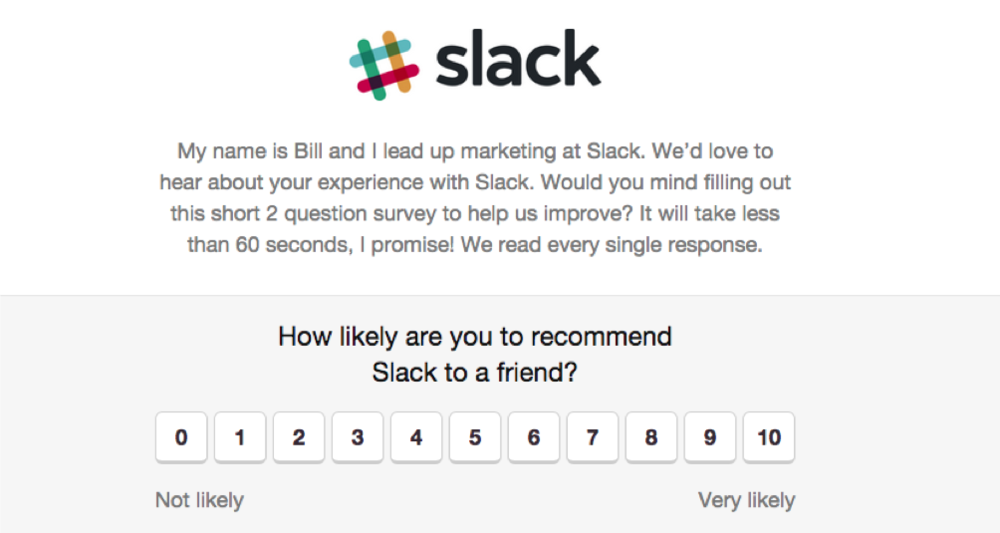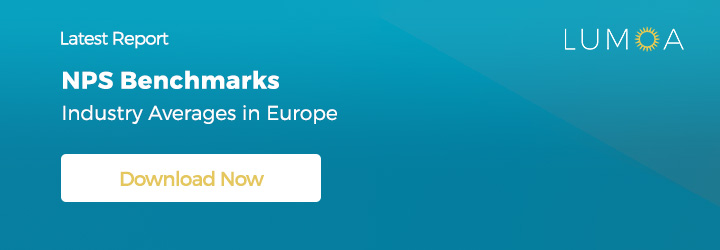7 Questions About Net Promoter Score Surveys – Bill Macaitis

Last updated on August 25, 2022
How many unicorns can be led by one man? Bill Macaitis doesn’t have limits. Bill is the man behind several hyper-growth tech companies. He has worked as a CMO/CRO at Slack, CMO at Zendesk and earlier senior vice president of marketing in Salesforce. Now Bill is helping other companies grow and put together marketing tech stack working at his own company, Macaitis Advisory.
In the customer experience field, Bill is often praised for growing Slack with the Net Promoter Score. Bill calls himself a “self-emitted NPS geek” and is a true advocate for better customer experience. We had a short conversation earlier this year to find out what is the secret of these companies (hint: customer experience).
1. What does customer experience mean for you?
“I noticed in life that incentives drive people. My dad used to say to me: “having a small incentive is all you need for people to change their behavior.
When I started to buy a lot of software as a CMO, I noticed that there were so few great customer experiences. If I would want to watch a video I would have to fill in 20-field forms, then I would get called and keep getting harassed. And when I would finally buy the thing, I’d be “Ok, how do I use this?” and everyone would run away. If I needed support, I couldn’t find anyone, I couldn’t find the links to helpdesks and it would take me three weeks to get a response. I was confused: this was absolutely the worst experience. Why were all these companies and teams doing this?
And I thought about it. The traditional metrics that are assigned to teams are the number of leads or number of deals closed. Customer success is often judged on how much more did they sell to customers, support is judged by how little is spent on support…
We are just minting out all these horrible experiences and yet like we want to go faster, we want to get more people to recommend us, talk about us and buy more… I thought that we can re-write all the metrics toward experience-based metrics and encourage employees to give a better experience.
I like NPS, it’s the sum of all these experiences that you have. It’s not just product marketing experience but your experience in from marketing, sales, support, legal to how fast the pages load. It’s everything, right? At Slack, we intensively used NPS and CSAT, we surveyed everyone, and we had a very specific methodology. You have to be proactive and when people responded, we would reach back out to them. It was an incredible learning experience. I fully recommend it.”
2. What is so special about Net Promoter Score?
“NPS gives you so many incredible benefits that it can fundamentally change your company growth. With NPS you can fundamentally change your company’s direction. If you’re a customer-driven company, and you’re not measuring NPS yet, that is one of the best things you can do to finally transform your company.”
3. Would you reach out to every single customer with an NPS survey?
“I like the methodology starting with the simple premise that we really want to help people to know how to use us. If there’s an issue we want to provide the addressee before they turn, we want to be minting our promoters, so we want to understand everyone in the company.
From just a pure marketing and sales point of view, you need to understand who the champions of your accounts are. They are your best advocates and they are the ones who are speaking on your behalf and introducing you to other people.
They are going to go to battle for you internally. You are never selling to only a person buying from you, they have to get through legal, procurement, IT, compliance. I believe that you should survey everyone.
Now with that said, I don’t like surveying anyone more than twice a year. You have to be careful about that, and at the same time automate the surveys so that they are always happening and you get feedback in real-time. It is extremely important to have an understanding of how every single person or organization feels about you and be corrective about that. Use all the data that comes from the NPS surveys to shake product roadmap and to improve your service.”
4. How do you increase the response rates of NPS?
“I found when you run really generic bad surveys, they sound like a canned robot wrote it. Who would want to answer “Flight 374 requests feedback”? I noticed that unsurprisingly people are not responding much to those. Also, if you write surveys that have 50 questions in it, people generally don’t respond to those either.
I learned the best surveys that people respond to are those arriving from a unique person. When we wrote an NPS survey, we would actually say “Hey! This is Bill. I am the CMO from Slack. Your feedback is really important to us and I read every one of your comments.” I did read them.”

5. Did you go through every single feedback comment even if there were thousands?
“Definitely. I think that a huge part of the role of CMO is to understand your customers’ pain points. The best thing with NPS is its one-sentence question “How likely are you to recommend, in this case, Slack, to a friend or colleague?” on a scale from 0 to 10.
The most important thing when you run the surveys is to ask the “why”-question. And once you get to all those why-questions you understand what the top reasons why people love us are (also, the top reasons why people hate us).
And many times your job in marketing or sales is to describe the company and a lot of times marketers tend to use their own more visionary words. If you just put it in the words that customers are saying, you will get a lot further.
For example, for Slack, it could be: “I feel that I am more productive, I am getting less email, I have more transparency with my company, more alignment…” We try to use the phrases they use to help us shape our value proposition.
On the flip side, we used a lot of the reasons why the detractors did not like us to shape our roadmap. And at the time we were building a lot of advanced features, but the feedback was just “Hey, you know I want the upload to go faster, I want your basic search to work better”. In the end, we decided to fix those more basic things. The data that customers give us is so important: it helps in shaping your value proposition, your messaging, your product roadmap and it’s just so valuable to just understand how your customers feel about you.”
6. How would you encourage promoters?
“One of the most important things is to just understand that these promoters are your fans, your champions, the folks that love you and are spreading the good word.
They are really an incredible part of your growth story and you have to understand who these people are, and show them some love, give them a platform to share their word. At Zendesk, we asked people to write a public review or sometimes we invited them to come to the office, meet some of the team. Sometimes we asked them to be interviewed for our next roadmap or to make a testimonial for us.In some cases we even said something like: Hey I’ve noticed that you love our product, would you mind introducing us to another department that you think would be a good fit for our company?”
There are so many great ways to kind of step into that evangelism and I think it’s just critically important. You want to understand and help these accounts, find who are these people, what are the problems they are facing and fix them.
One of the things that we and a lot of software companies would run into is how many cycles do we give towards fixing bugs vs. just developing new features. Of course, new features are always shiny, beautiful and everyone wants them, but the bug is like the pebble in your shoe, a little annoying at first but when you walk with it for a week it would be extremely uncomfortable. NPS gives you the answers. Sometimes you may need to pause on building out new features and take care of some of these bugs that are causing a really bad experience.”
7. Last question, how would you measure ROI of customer experience management with NPS?
Let’s say you have an average NPS score of 10. Now you embark in this customer-centric philosophy, you address a lot of issues, your delight your customers. So your score goes up to 40.
This means that if you have ten people in the room, in the past, when the score was 10, only 1 person was actively recommending you out of 10. Now your score is 40 and you have 4 people that are actively recommending you.
Then model this, find out how your advocacy actually increased. You can measure that by sending out the survey to the new users asking, “how did you hear about us?” People trust other people and so the word-of-mouth is converting much better and probably has a higher CLV, better deal size. Now you can attribute all this growth that is coming into investing in experience. If you look at the most successful companies in history, just from the purest perspective they all have like incredible NPS scores: Amazon, Netflix… These companies are fanatic about their experience and crazy about their NPS scores. We should all look up to that.”
